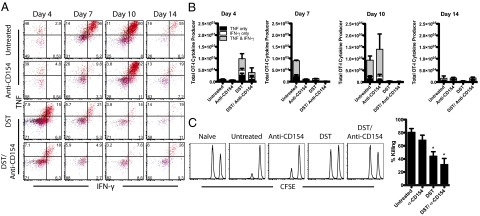Fig. 3.
CD154 blockade delays donor-reactive CD8+ T cells differentiation into multifunctional cytokine-producing cells. Mice were treated as described in Fig. 1 and killed at the indicated time points. (A) Concatenated flow plots of intracellular cytokine staining in splenic OT-I T cells after stimulation for 4 h in vitro with SIINFEKL peptide. (B) Cytokine production by splenic OT-I T cells, summarized from three experiments with three mice per group. Untreated mice developed into dual cytokine producers at day 7 (6.22 × 104 ± 0.29 × 104). DST accelerated T-cell production of TNF and IFN-γ (D4: 4.90 × 104 ± 2.14 × 104). Anti-CD154 delayed T-cell differentiation (D10: 1.15 × 105 ± 0.65 × 105). Anti-CD154/DST inhibited differentiation (D4: 2.08 × 104 ± 1.98 × 104). (C) Day 10 in vivo cytotoxicity assay. Peptide-coated targets and unpulsed control targets were labeled with different concentrations of carboxyfluorescein succinimidyl ester and adoptively transferred into recipients. After 18 h, the ratio of unpulsed targets to peptide-pulsed targets remaining was assessed by flow cytometry. Relative to untreated controls, anti-CD154 treatment did not alter killing of target cells (91.01% ± 0.82% vs. 66.59% ± 11.03%; P = 0.379). DST treatment significantly impaired killing (55.52% ± 8.28%; P = 0.003). Anti-CD154/DST significantly impaired cytolysis (28.26% ± 12.78%; P = 0.001). Data are summarized from two experiments with five mice per group. Values are mean ± SEM.

